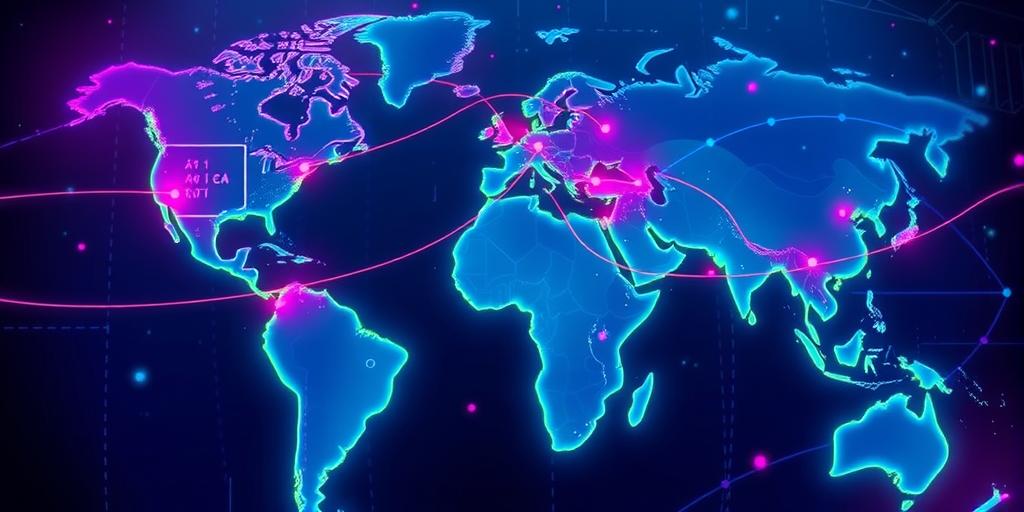Are you ready to witness a revolution? The world of supply chain management is undergoing a dramatic transformation, driven by groundbreaking technologies that promise unprecedented efficiency and resilience. From AI-powered predictive analytics to blockchain’s immutable ledger, the future of getting goods from point A to point B is being rewritten before our eyes. Let’s dive into the exciting changes shaping the modern supply chain!
The Rise of Artificial Intelligence (AI) in Supply Chain Management
AI is no longer a futuristic concept; it’s a powerful tool reshaping supply chains today. Imagine a system that can predict disruptions before they even happen, optimizing routes and inventory levels with pinpoint accuracy. This is the reality AI offers. Machine learning algorithms analyze vast datasets – weather patterns, traffic conditions, even social media trends – identifying potential bottlenecks and proactively mitigating risks. This predictive capability minimizes delays, reduces costs, and ensures a smooth flow of goods. The benefits extend beyond just prediction; AI can also automate repetitive tasks, freeing up human resources for more strategic initiatives.
AI-Powered Predictive Analytics: Forecasting Demand and Preventing Disruptions
One of the most impactful applications of AI is predictive analytics. By analyzing historical data and real-time information, AI algorithms can accurately forecast demand, allowing businesses to optimize their inventory levels and avoid stockouts or overstocking. This precise demand forecasting minimizes waste and improves profitability. Moreover, AI can identify potential supply chain disruptions, such as natural disasters or geopolitical instability, enabling proactive mitigation strategies that safeguard against delays and financial losses. The implementation of these advanced AI systems requires careful planning and integration with existing infrastructure, but the rewards are substantial in terms of efficiency and cost savings.
AI-Driven Automation: Streamlining Processes and Improving Efficiency
Beyond prediction, AI is automating various tasks throughout the supply chain, from warehouse management to transportation logistics. Robots powered by AI are taking over repetitive tasks like picking and packing, increasing speed and accuracy while reducing human error. AI-driven route optimization software analyzes numerous factors – distance, traffic, fuel prices – to determine the most efficient routes for delivery vehicles, lowering transportation costs and reducing delivery times. The integration of these automated systems leads to significant gains in operational efficiency and productivity.
Blockchain Technology: Enhancing Transparency and Security
Blockchain, the technology behind cryptocurrencies, offers a revolutionary approach to supply chain transparency and security. Its decentralized, immutable ledger provides a secure and verifiable record of every transaction and movement of goods, from origin to final destination. This eliminates the need for intermediaries and reduces the risk of fraud and counterfeiting. Businesses can track their products in real-time, ensuring authenticity and provenance, building trust with consumers and enhancing brand reputation. The impact on industries dealing with high-value goods or those with stringent regulatory requirements is particularly significant.
Blockchain’s Role in Track and Trace Systems
Implementing blockchain-based track and trace systems allows businesses to monitor their products throughout the entire supply chain. This real-time visibility enables swift identification of potential problems and facilitates rapid response measures, minimizing disruptions and maintaining supply chain integrity. Consumers also benefit from this increased transparency, gaining confidence in the authenticity and origin of the products they purchase. The ability to track products across borders and through various stages of processing is a major advantage, especially for complex global supply chains.
Improving Supply Chain Security and Reducing Counterfeiting
The immutable nature of the blockchain makes it an ideal tool for combating counterfeiting. By recording every transaction and movement of goods on the blockchain, businesses can verify the authenticity of their products and prevent counterfeit goods from entering the market. This significantly reduces financial losses and protects the brand reputation. The increased security also makes it harder for malicious actors to tamper with products or alter information, ensuring greater trust and reliability throughout the supply chain.
The Internet of Things (IoT) and the Connected Supply Chain
The Internet of Things (IoT) is connecting every aspect of the supply chain, from sensors on shipping containers to smart warehouse management systems. This real-time data collection enables greater visibility, improved decision-making, and enhanced operational efficiency. IoT sensors embedded in products and assets provide real-time data on location, temperature, humidity, and other critical factors, allowing businesses to monitor their goods throughout the supply chain and take corrective action when necessary. This data-driven approach to supply chain management leads to reduced losses, improved customer satisfaction, and optimized operations.
Real-Time Tracking and Monitoring: Enhancing Visibility and Efficiency
IoT-enabled devices provide real-time data on the location and condition of goods, allowing businesses to track their products every step of the way. This detailed tracking enhances visibility, enabling proactive management of risks and disruptions. Businesses can pinpoint delays, identify potential problems, and promptly take corrective actions, minimizing the impact of unforeseen circumstances on the supply chain. This real-time visibility empowers improved decision-making and enhances overall efficiency.
Data-Driven Optimization: Improving Decision-Making and Operational Efficiency
The massive amounts of data generated by IoT devices enable businesses to make data-driven decisions. This information can be used to optimize inventory levels, improve route planning, and enhance resource allocation. By analyzing real-time data, businesses can identify inefficiencies and implement changes that lead to significant improvements in operational efficiency, reduced costs, and enhanced productivity. This data-driven approach to optimization is a hallmark of the modern, connected supply chain.
The Future of Supply Chain Management
The integration of AI, blockchain, and IoT is creating a more transparent, resilient, and efficient supply chain. While challenges remain in terms of implementation and integration, the potential benefits are enormous. Businesses that embrace these emerging technologies will be better positioned to compete in today’s dynamic market, delivering superior customer experiences and achieving greater profitability. Don’t get left behind – explore the transformative power of these innovations and shape the future of your supply chain!




